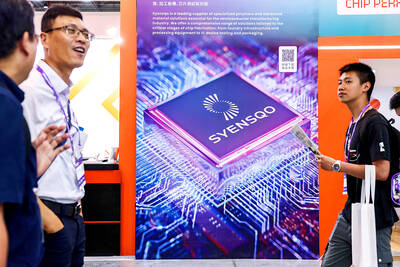The four government-run funds will go bargain-hunting in the stock market following its recent drop amid the global economic slowdown, Cabinet Spokesman Shieh Jhy-wey (謝志偉) said yesterday.
"Unfortunately, Taiwan was affected by the dramatic fluctuations in global stock markets. For sure, the four funds will enter the stock market. But the Executive Yuan will not meddle in the stock market mechanism," Shieh said.
The four government-run funds -- each worth more than NT$200 billion (US$6.17 billion) -- are the Civil Servant Pension Fund (
Shieh's remarks came after the TAIEX fell 6.51 percent on Tuesday amid a global stock market slump on fears of recession in the US.
The TAIEX closed down 173.56 points, or 2.29 percent, yesterday, at 7,408.40, despite a brief rally on the 75 basis point rate cut by the US Federal Reserve overnight.
"Domestic sentiment remains shaky," SinoPac Securities Corp (永豐金證券) analyst Jesse Knutson said in a client note yesterday. "Early gains were soon reversed as investors opted to cash out rather than chase prices, while margin calls aggravated declines among tech sub-sectors with LED [light emitting diode], networking and PCB [printed circuit board] hit the hardest."
Turnover was active yesterday, rising 20.32 percent to 161.864 billion from the previous day. Foreign investors bought a net NT$504 million in Taiwanese shares, while two domestic institutional investors -- investment trust firms and proprietary traders -- collectively sold a net NT$4.496 billion, the stock exchange tallies showed.
Both Chinese National Association of Industry and Commerce (工商協進會) chairman Theodore Huang (黃茂雄) and General Chamber of Commerce (全國商業總會) chairman Chang Ping-chao (張平沼) expressed concerns over the US recession and its likely impact on the local stock market.
Chang said there was no reason for the local benchmark to fall below the 7,000 point as most listed companies' earnings were healthy, with secured orders.
Huang urged businesses to be prudent and said that in the worst-case scenario, a recession could take "three to five years to bottom out."
Fears of a US recession and slower exports prompted Standard Chartered Bank on Tuesday to lower its previous economic projection for Taiwan from 3.8 percent to 2.7 percent to 2.8 percent. Citigroup last week dropped its forecast for Taiwan from 4.7 percent to 4.5 percent this year.
"It is understandable for people to panic after seeing the global markets tumble," Council for Economic Planning and Development vice chairman Thomas Yeh (葉明峰) said. "But evaluating the wellbeing of an economy through subjective judgments based on short-term sentiments is irrational."
Yeh said a contraction on external demand was expected and would happen after major exporting markets were hit by the US crisis, but that exports are not the only factor used to assess growth.
Yeh said he was not aware of a government plan to lower its economic growth forecast for this year.
“When we set the goal of 4.8 percent growth for the economy this year, we had already taken the influence of high oil prices and the aftermath of the US subprime crisis into account,” he said.
The government's Directorate General of Budget, Accounting and Statistics said the nation's economic growth would be 4.53 percent this year.

SEMICONDUCTOR SERVICES: A company executive said that Taiwanese firms must think about how to participate in global supply chains and lift their competitiveness Taiwan Semiconductor Manufacturing Co (TSMC, 台積電) yesterday said it expects to launch its first multifunctional service center in Pingtung County in the middle of 2027, in a bid to foster a resilient high-tech facility construction ecosystem. TSMC broached the idea of creating a center two or three years ago when it started building new manufacturing capacity in the US and Japan, the company said. The center, dubbed an “ecosystem park,” would assist local manufacturing facility construction partners to upgrade their capabilities and secure more deals from other global chipmakers such as Intel Corp, Micron Technology Inc and Infineon Technologies AG, TSMC said. It

People walk past advertising for a Syensqo chip at the Semicon Taiwan exhibition in Taipei yesterday.

NO BREAKTHROUGH? More substantial ‘deliverables,’ such as tariff reductions, would likely be saved for a meeting between Trump and Xi later this year, a trade expert said China launched two probes targeting the US semiconductor sector on Saturday ahead of talks between the two nations in Spain this week on trade, national security and the ownership of social media platform TikTok. China’s Ministry of Commerce announced an anti-dumping investigation into certain analog integrated circuits (ICs) imported from the US. The investigation is to target some commodity interface ICs and gate driver ICs, which are commonly made by US companies such as Texas Instruments Inc and ON Semiconductor Corp. The ministry also announced an anti-discrimination probe into US measures against China’s chip sector. US measures such as export curbs and tariffs

The US on Friday penalized two Chinese firms that acquired US chipmaking equipment for China’s top chipmaker, Semiconductor Manufacturing International Corp (SMIC, 中芯國際), including them among 32 entities that were added to the US Department of Commerce’s restricted trade list, a US government posting showed. Twenty-three of the 32 are in China. GMC Semiconductor Technology (Wuxi) Co (吉姆西半導體科技) and Jicun Semiconductor Technology (Shanghai) Co (吉存半導體科技) were placed on the list, formally known as the Entity List, for acquiring equipment for SMIC Northern Integrated Circuit Manufacturing (Beijing) Corp (中芯北方積體電路) and Semiconductor Manufacturing International (Beijing) Corp (中芯北京), the US Federal Register posting said. The